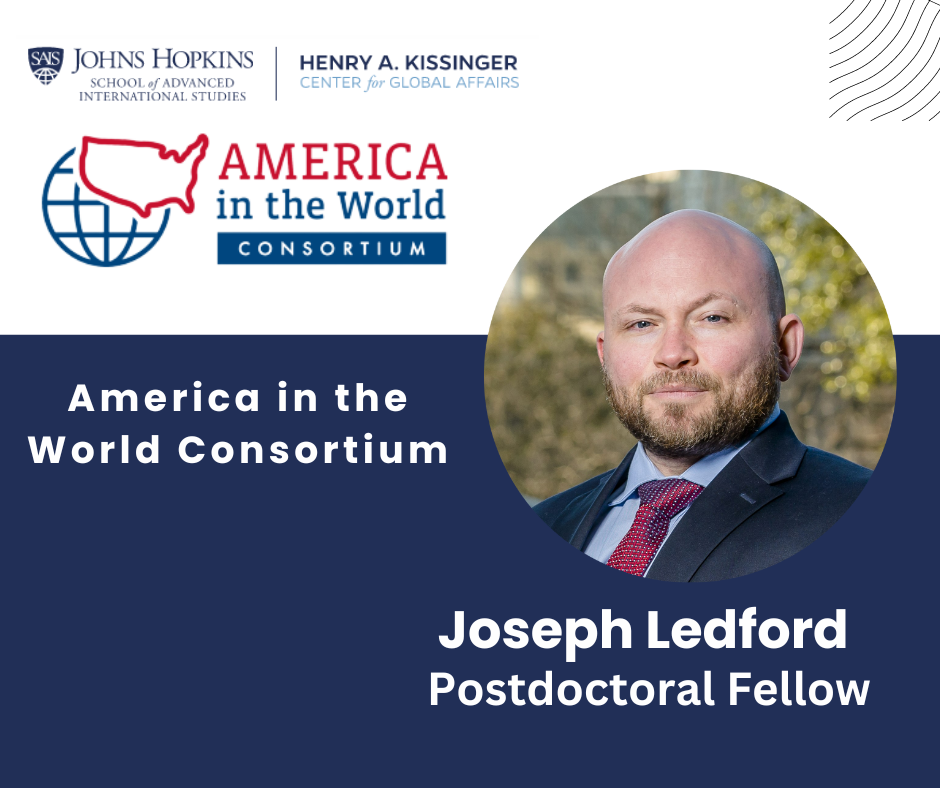Featured Scholar: Joseph Ledford

What are your current research interests?
I specialize in the history of US foreign relations, focusing on the intersection of domestic politics and foreign policy. My research seeks to understand how national security preoccupations shape US power and, in turn, how state power shapes national security policy. I am concerned with the foreign policy process as well as the roles of the president and Congress in exercising American power. I also maintain an interest in contemporary issues of presidential politics and national security.
What project(s) are you currently working on, and what work are you most excited about?
Mostly, I am devoted to revising my book manuscript, tentatively titled Restoring the Presidency: Ronald Reagan and the Iran-Contra Affair. Based on years of research and newly declassified documents, my book offers a comprehensive account of the Iran-Contra affair, from the scandal’s origins in the politics of the 70s through its resolution in the mid-1990s. Restoring the Presidency, I believe, will challenge popular interpretations of the affair and contribute to our understanding of Ronald Reagan’s presidency. I anticipate completing the manuscript in short order, as I have only a small amount of research to complete and a couple of chapters to refashion. In addition to working on the Iran-Contra manuscript, I am conducting preliminary research for my next book project, which will follow the history of Senator Arthur Vandenberg’s aphorism that “politics stops at the water’s edge.” Conceived as a diplomatic and political history of the bipartisan consensus on U.S. global leadership, this book will examine American engagement with the world since 1945 from the vantage of the politicians and policymakers responsible for it. Scholars and policymakers question whether this consensus has frayed beyond repair due to the domestic and geopolitical upheavals of the last twenty-five years. Presently, though, a new iteration is forming in the context of a sustained great power competition with China. In response to these pressing circumstances, I propose to offer a vital historical perspective on the contested role of bipartisan internationalism while exploring the capacities of America’s unique constitutional system to maintain global order.
How and when did you develop this interest? How did it evolve?
During my graduate training, I initially concentrated on US-Latin American relations in the 1980s, which led me to studying the Iran-Contra affair. I was not satisfied with what the literature offered on Iran-Contra by way of historical analysis. I intuited that Iran-Contra likely had a more profound impact on the United States. Upon further research, I became interested in not only how and why Iran-Contra happened, but also to what extent the scandal affected American politics and institutions. My research both confirmed my suspicions and broadened my intellectual trajectory, transforming me from a regional specialist into a diplomatic historian deeply engaged with American political history and the historical development of American political institutions. The theme of bipartisanship, for its part, emerged from writing the history of Iran-Contra. One of the central arguments of Restoring the Presidency is that the outcome of Iran-Contra was shaped by the bipartisan consensus on a powerful president serving as the foundation of national security. From this conclusion, I developed a growing interest in the historical significance of the bipartisan consensus in US foreign policy, which I intend to further explore in my next project.
What drew you to the Kissinger Center and your current fellowship?
As a historian, I am committed to bringing an analysis of the past to bear on present and future national security challenges. The Kissinger Center is the premier research institute for doing so—featuring world-class faculty, prime location, and a sterling cast of brilliant fellows, which makes for an energetic, fertile environment to study strategy and statecraft; war and diplomacy; and the art of government. My scholarship has benefited tremendously from being here. I relish every conversation—or debate—with my colleagues. If you’re interested in applying historical insights to issues of war and peace, there’s no better place to reside. I am grateful to have the support of the America in the World Consortium (AWC), a dynamic partnership between Johns Hopkins SAIS, UT-Austin, and Duke. AWC provides me with the rewarding opportunity to engage with an interdisciplinary network of scholars who are interested in producing policy-relevant research and advancing the debate about America’s role in the world. Intellectually and professionally, AWC is the perfect match for me!